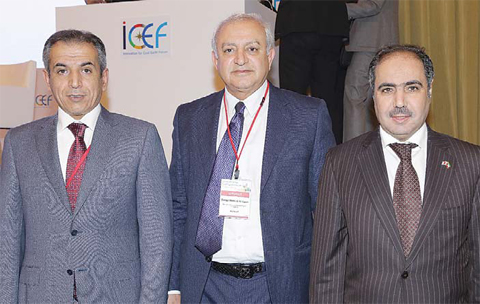 Education Minister Dr Bader Al-Essa, Ambassador to Japan Abdulrahman Al-Otaibi, Undersecretary Dr Hamed Al-Azemi pose for a group photo. —KUNA
Education Minister Dr Bader Al-Essa, Ambassador to Japan Abdulrahman Al-Otaibi, Undersecretary Dr Hamed Al-Azemi pose for a group photo. —KUNATOKYO: Kuwait's Minister of Education and Higher Education Dr Bader Al-Essa yesterday urged the international community to strive for a world with a healthy environment, more sustainable and free from pollution. At the plenary session in the Innovation for Cool Earth Forum (ICEF) focusing on future perspective of addressing climate change through innovation, Dr Al-Essa stressed that replacing the use of gas and harmful chemicals with safer alternatives, is one step countries may take to improve on climate changes and reduce pollution.
"Many countries have responded to repeated calls for a healthy, sustainable environment and reducing the negative effects that industries impact on the climate. On the other hand, some countries contribute to environmental pollution, destruction of the climate and changes in the earth's temperature, by allowing industries to continue with poor practices and protocols," the minister, who heads the Kuwaiti delegation, pointed out.
"It is the duty of scientists, industry owners, policy makers and countries in general, to work towards a more healthy and sustainable environment by improving current policies, creating new tools and developing new technologies to that affect." While confirming that all countries are held accountable at the legal, political and humanitarian levels to the current status of pollution and global warning, Dr Al-Essa underlined the bigger responsibilities of industrial nations towards the environmental issues, saying, "Industrial countries are required to be more stringent with enforcing the law to protect the environment and human health."
Three Zero initiatives
The two-day conference gathers more than 1,000 researchers, business leaders, and policymakers from around the world to share a vision and establish partnerships for lasting global reduction in greenhouse gases through innovative low-carbon technologies. Muhammad Yunus, 2006 Nobel Peace Prize laureate and Chairman of the Bangladesh-based Yunus Centre, called for "three Zero initiatives-Zero poverty, Zero unemployment and Zero net emission-to attain the vision of sustainable development goals that improve human lives.
As an example of popularizing solar energy in Bangladesh, Yunus, renowned microfinance pioneer and founder of Grameen Bank, also said his non-profit energy company has successfully installed more than 1.6 million solar home systems in the country's rural areas over the past 18 years. The Kuwaiti delegation includes Ambassador to Japan Abdulrahman Al-Otaibi, Undersecretary of the Ministry of Higher Education Dr Hamed Al-Azemi, Undersecretary of the Ministry of Education Dr Haitham Al-Athari, Secretary General of the Private Universities Council Dr Habib Abul, Director General of the Applied Education and Training Dr Ahmad Al-Athari, Vice President for Academic Affairs at Kuwait University Dr Firyal Bou-Rabee.
Based on a proposal by Japanese Prime Minister Shinzo Abe, Tokyo launched the ICEF last year to provide a global platform, where the world's leading policy makers, business persons, and researchers can meet and cooperate with each other to address climate change through innovation. This year's annual meeting is a critical opportunity to discuss innovative measures ahead of the United Nations Framework Convention on Climate Change (COP21) in Paris due November, which will adopt a new international framework in tackling climate change. - KUNA










